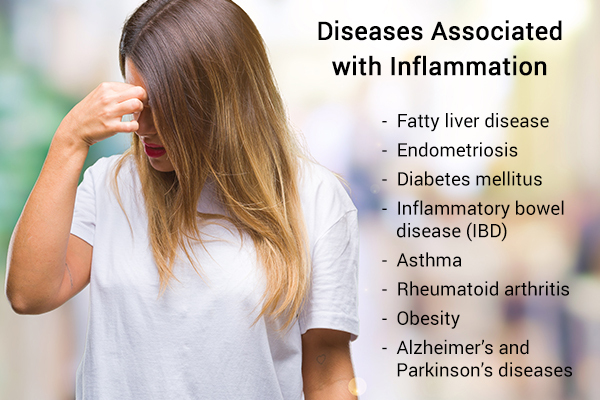In this article:
Inflammation is the medical term for the burning and swelling associated with a wound, injury, or infection.

It is the body’s natural reaction to fight a harmful foreign substance – a pathogen, chemical irritant, or object. At times, it is also a reaction to an injury or disease in the body. (1)
Types of Inflammation
Inflammation is an immune system response. It can be of two main types: acute inflammation and chronic inflammation. (2)
- Acute inflammation: It is a temporary bout of inflammation that may occur due to an injury, infection, or chemical exposure. When you get injured or exposed to an allergen, the body sends white blood cells to the area to help protect it. This also happens in the case of an infection. Acute inflammation helps your body heal faster and resolves in a few days. (3)
- Chronic inflammation: Chronic inflammation is a long-term inflammatory response in the body that can occur due to a number of reasons. Smoking, excessive alcohol consumption, and chronic diseases such as kidney disease, heart disease, diabetes, and cancer can all lead to it. (4)
What Diseases Are Associated With Inflammation?
Here is a brief list of some diseases that are commonly associated with inflammation:

- Fatty liver disease: Fatty liver disease can occur due to a number of reasons: long-term alcohol use, genetics, obesity, etc. (5)
- Endometriosis: Endometriosis is a condition that causes overgrowth of the uterine lining. In some cases, it may spread to the abdomen and affect other organs. (6)
- Type 2 diabetes mellitus: People with diabetes usually tend to have mild inflammation. (7)
- Type 1 diabetes mellitus: Type 1 diabetes can also cause an inflammatory response in the body. (7)
- Inflammatory bowel disease (IBD): Crohn’s disease and inflammatory bowel disease are two major causes of chronic inflammation. (8)
- Asthma: Asthma can cause swelling or inflammation of the airway tract. (9)
- Rheumatoid arthritis: This disease causes pain and inflammation in the joints. (10)
- Obesity: Obesity can lead to inflammation in the long term. Excessive deposits of fat in the body can cause inflammatory responses. (11)
- Alzheimer’s and Parkinson’s diseases: Both these neurological conditions can cause inflammation in the brain. (12)
- Cancer: Rarely, chronic inflammation can be due to the growth of tumors. It is linked with certain types of cancers. (13)
Causes of Inflammation
Here are some common causes of inflammation:
- Infections
- Certain injuries such as a sprain or a splinter in your hand
- Exposure to certain irritants such as a chemical, UV radiation, and an allergen (1)
Signs of Inflammation
Here are some common symptoms of inflammation in the body:
- Irritation and burning sensation
- Warmth in the inflamed area
- Swelling
- Mild to severe pain (depending on the cause)
Chronic inflammation may lead to a few more symptoms such as:
- Fatigue
- Diarrhea or acid reflux
- Weight fluctuations
- Frequent infections (1)
Moreover, chronic and acute inflammation can both cause the immune system to overwork. This can lead to tiredness and dullness in the body. (1)
Treatment of Inflammation
Conventional drugs that combat chronic inflammation include:
- Metformin is an antidiabetic drug that can also fight inflammation in people with diabetes. (14)
- Statins interfere with the biomediators of inflammation and can reduce it. (15)
- Nonsteroidal anti-inflammatory drugs (NSAIDs) can help reduce inflammation and pain associated with injuries and infections. (16)
- Corticosteroids can reduce inflammation caused by allergic reactions and other reasons. (17)
- Antibiotics and antiviral medications help fight infections and treat the inflammation caused by them. (18)
- Disease-modifying antirheumatic drugs (DMARDs) can help fight inflammation due to arthritis. (19)
How Is Inflammation Diagnosed?

Doctors can generally diagnose inflammation by observing the patient and inquiring about their medical history.
Certain tests can help confirm the diagnosis:
- C-reactive protein (CRP) test: It is a blood test that measures the levels of C-reactive protein in the blood. C-reactive protein is released by the liver as a reaction to inflammation. (20)
- Erythrocyte sedimentation rate (ESR) test: It is another blood test that can be used to diagnose inflammation in the body. (21)
Risk Factors Associated With Chronic Inflammation
Several risk factors promote a low-level inflammatory response. These include:

- Age: Older people tend to have an increased inflammatory response.
- Obesity: Obesity can cause an increase in pro-inflammatory markers due to excessive fat deposits.
- Diet: Consuming excessive fat and sugars causes an increase in fatty acids and can lead to inflammation.
- Smoking: Smoking is also associated with increased levels of CRP and inflammatory response in the body.
- Low sex hormones: Low levels of sex hormones are associated with an increase in pro-inflammatory markers and inflammation.
- Stress and sleep disorders: Chronic stress and insomnia can both cause an upsurge of stress hormones in the body, which is known to trigger inflammation. (2)
When to See a Doctor
Consult a doctor if:
- You do not seem to get better after treatment.
- You feel feverish or have chills
- You notice pus discharge from a wound.
Final Word
Acute inflammation can occur due to temporary causes such as an injury or infection and usually resolves within a few days or weeks. Chronic inflammation, on the other hand, can last for months or years and is usually associated with more serious conditions such as chronic diseases.
Discuss your symptoms with your doctor, and they will guide you to the most suitable treatment for your condition.

- Was this article helpful?
- YES, THANKS!NOT REALLY


